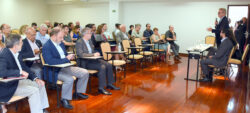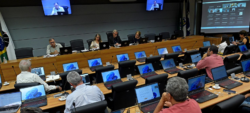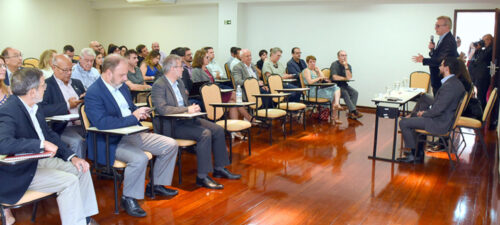The implementation project of the International Hub for Sustainable Development (HIDS) at Unicamp and neighboring areas should go to the transition team as a program to be considered a priority in the new government of the State of São Paulo, which starts now in January 2023.
This statement was made this Wednesday (21) by Professor Anderson Correia – dean of ITA (Instituto Tecnológico de Aeronáutica) and leader of the transition group of the new government for the theme of Economic Development, Science and Technology. “We will put HIDS in the final report. And take it to the transition team with the motivation for it to be evaluated as a priority”, said the rector of ITA, at the end of the almost three-hour meeting he held with the rector of Unicamp, professor Antonio José de Almeida Meirelles, pro- deans and with members of the central administration of the University.
Campinas Economic Development secretary, Adriana Flosi – who is part of the state transition team in this sector and who also participated in the meeting – said she was convinced of the importance of consolidating HIDS.
“I will recommend it as an investment proposal for the first hundred days of government,” she said. “The project is fully mature, it already has a master plan and the municipal government has made efforts to deal with the issue of the new zoning law for the area”, added the secretary.
“This leads to a union of forces and a favorable environment for the state government to announce the program as something that has, in fact, the consistent possibility of being consolidated”, concluded the secretary.
The Hub's planning area involves the Unicamp campuses (including Fazenda Argentina, with 1,4 million m2, adjacent to the University campus, in the District of Barão Geraldo), PUC-Campinas and Facamp. In addition to these areas, the entire territory of Ciatec II – Pole of High Technology with 8,8 million square meters, totaling 11,3 million m2.
The Hub is being conceived to act as a complex of living laboratories, with the intention of becoming an international model of smart and sustainable district.
Public policies for S&T
In addition to HIDS, the group discussed public policies for the Science and Technology sector and made suggestions about those that could be incorporated by the new government. One of the suggestions is the construction, by the State government, of accesses to the region defined for the installation of HIDS. In addition, the Unicamp group suggested the installation of a regional hospital – which could be built within the HIDS area – and the adoption of state student stay programs.
Unicamp also proposed the participation of state public universities in the construction and implementation of a public policy for basic education and asked for the maintenance of rules that guarantee the budgetary autonomy of state universities in São Paulo. In this last aspect, the rector suggested that the base of incidence of the share of the state universities be similar to that of FAPESP and that this university autonomy becomes a state law. “The meeting was very productive. The dean [Meirelles] brought valuable, very detailed information that will be very important for the transition team”, said Anderson Correia.
“Unicamp has big projects, which have interaction with all the departments of the government of the State of São Paulo. I am sure that the report that we are going to hand over to the new governor of São Paulo, through the transition team, will accelerate the development of the projects”, added Correia. “I am also sure that the government of São Paulo can contribute a lot with the projects developed by Unicamp, all of them with a strong social impact. This visit greatly facilitated the work (of the transition team) and generated good expectations. We are going to make a very positive report to support the projects under development at the University”, concluded Correia.
Inclusion Programs
Unicamp's rector said he was very optimistic with the meeting. “We want a university that is increasingly open to interaction. We are very interested in the possibility of being partners in actions that solve the problems of the State and collaborate to solve the country's problems”, said Meirelles. The dean stated that one of the most urgent issues for the three state universities in São Paulo has been inclusion programs. He recalled that these programs are changing the profile of university students in Brazil, but warned that they require robust permanence policies and that this has exerted strong pressure on the institutions' budgets.
For next year, for example, Unicamp forecasts investments of R$ 112 million in student assistance programs. In 2022, it was R$ 101 million. “In the contacts I have had with deputies or even with representatives of the state and federal governments, I always suggest that attention be given to the permanence programs”, says Meirelles.
The dean recalled that these programs could be carried out by the universities together with the state government. “Unicamp, for example, has 26 degrees in different areas – many others are offered by USP and Unesp. I wonder if it wouldn't be possible to carry out a large state program of student retention associated, for example, with people from teaching courses, so that the counterpart would be for students to go to schools and help improve the quality of education. You would combine two actions to solve the problems we have: the need for improvement in public education and the issue of student permanence at the University”, he explains. This suggestion was forwarded by Unicamp to the state government's transition team.
Originally published on Unicamp website





